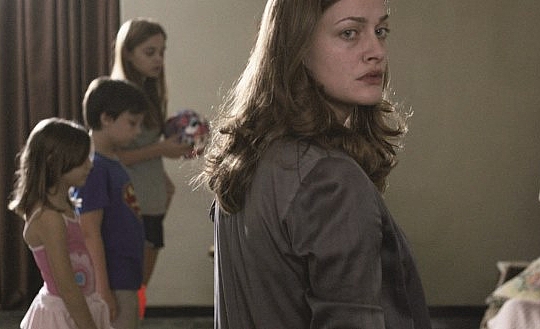For all sorts of reasons, Michael Faber’s Under The Skin (2000) feels like the sort of book that won’t lend itself to adaptation. It’s not so much the plot – Isserley, a solitary female driver, traverses the Scottish countryside, picking up unsuspecting male hitch-hikers and dispatching them to an unanticipated, final destination – as the otherworldly conceit that shapes the book. Faber leads the reader so far up the garden path – well, along country roads – that when Isserley’s true identity and impetus for casual homicide are revealed, all that one can do is to acknowledge that we sure as hell didn’t see that coming.

All this means that the recent adaptation, starring Scarlett Johannson and featuring at this year’s Jerusalem International Film Festival, faced a particularly tricky issue from the start: How to preserve the sense of unexpected that shapes the source material? One can’t, of course. At least not entirely, given that the source material is an award-winning book. And so writer/director Jonathan Glazer adroitly shifts the source materials’s centre of gravity from the unexpected to the undetected, the film (written with Walter Campbell) principally preoccupied with the unfathomable depths of what we think of as being human.
Johansson (here, unnamed) trawls the streets of Glasgow in a suspiciously accommodating van, picking up unsuspecting young men. She questions them closely before offering them a lift: friends, family, anyone that might be waiting for them and might set off an alarm if they don’t turn up soonish? Not in so many words, of course. In any case, the questions are pretty much for her benefit. Even in a fright-wig and crisp upper-middle-class English elocution, Johansson possesses enough charisma to distract at close quarters, even if momentarily. But then, once they’re inside the van, everything changes.
In essence, she plays two different characters. The first is crisply spoken, leaning ever so slightly towards the naif, but clad in figure hugging stonewash and a fake fur coat. (The pick-up scenes were improvised; none of the unsuspecting young men realised that they were being hit on by Hollywood royalty, as it were.) She clearly doesn’t fit in with her surroundings, but the discomfort is minimal. She remains in control. But then, there is her second self, which she reverts to after her job is done. This “real” self is disconcerting blank; devoid of passion, emotion, autonomy, anything aside from the job at hand. (There’s one scene, involving a baby, which is as cold as anything you’ll ever see Ms Johansson do.)
Under The Skin is not the sort of film one might normally associate with Ms Johansson. Many of her recent films (most, perhaps?) rely on some projection of her sensuality, which, admittedly, she does project very well. Under The Skin does lean on her, but in a different way. Her Preying Mantis seduction-and-decapitation routine is for a reason; murder for a higher purpose, you might say. But eventually, it awakens something in Ms Johansson; watching her sense of self-actualisation grow is a very unusual thing. It is strange that this, her “real” self, so far as the film is concerned, is the vulnerable one. But it makes sense.
There are hiccups along the way. The impeccable aesthetics, it seems, serve as substitutes at times for fully formed narrative. To be fair, Glazer is obliged to play with less than a full deck of cards from the start. (Pretty much every review I’ve read of this film since I watched it, about four months ago, makes much of the central pivot from the source material. I’ve decided to avoid spelling it out; I do think that the un-knowing-ness with which one might enter the film will make just that bit of a difference.) But he makes the best of what he has. The imagery, a million shades of washed away grey, and the mechanical incidental “music” feed into an unsettling ambience. As for Ms Johansson? It feels a little like anti-acting. Everything about this film confounds what we know about her. Which is both a hindrance and a help. I found Under The Skin an interesting film, if a bit vague about its ultimate destination; I’m not sure what I would have made of it if another actress, not quite as firmly embedded in my consciousness, had taken Ms Johansson’s place. But a strong performance against type has drawn attention to the film effectively. Which seems like a fair compromise to make.

Taking a completely different route, Miss Violence, directed and written (with Kostas Peroulis) by the Greek director Alexandros Avranas, is as uncompromising a film as it is possible to make without being wilfully provocative. And even that is up for debate.
In the first scene, Angeliki is celebrating her 11th birthday. With her are a slightly older girl, two younger children, a young-ish woman, a middle aged man and a woman who may or may not be older than the man. They pose for a family picture, a cake is produced, music is cued up on a CD player and there is dancing. Whilst we are still trying to unpick the precise family relations and hierarchy, the birthday girl walks to the window, swings her legs over the edge, smiles a small private smile and allows herself to fall to her death.
Miss Violence is not so much a film where nothing is what it seems, but rather a film where all the indicators point in one direction, that direction being the one you really don’t want to head towards. What we do pick up quickly is that this in this seemingly undistinguished Athen-ite family – unemployment, the bane of contemporary Greek society, figures largely – there are secrets, and there is a liar. The Father (Themis Panou) cajoles everyone to act as though all should be well and that Angeliki’s death is a painful and unexpected surprise. But aspects of his true self squeeze through the facade. He takes the door off the bedroom of Mykos, the older girl, “because we don’t keep secrets here”; after pouring for himself a bowl of cornflakes, he weighs the bag before putting it back in the cupboard. Eleni, the youngish woman, is curiously passive and pliant. She discovers that she is pregnant; he accompanies her for a check up with a gynecologist and corrects the professional’s assumption that he is her husband, No, I’m her father, he replies. He then visits an acquaintance, and asks if he will accept legal responsibility for the pregnancy in return for money. The older woman, the Father’s wife, is not complaint but rather silent. She has things to say, but won’t. Why? We don’t know.
Technically, Miss Violence is an accomplished and engaging film. Avranas works the suspense well, forcing us to grasp at clues desperately even as our sense of dread increases. After a while, we hear the small children refer to him as Grandfather; Mykos, the slightly older teenage girl, is his daughter, we discover. He treats them all with the same tyrannical brutality, but even as the social service begin to sniff around the family set up, we know that there is something more. There is a sterility that hovers around much of the film, carefully composed scenes and shots that highlight the artificial sense of order, even as they hint at the barely-restrained violence just under the surface
However: Emotionally, Miss Violence is a disturbing film, so much so that – even after acknowledging its technical and narrative merits – I would be hard put to recommend as a must see with a clear conscience. Eventually, the truth erupts with a physical brutality, an scene so unnerving and unrestrained – despite the subtle and not-so-subtle clues along the way – that I swore out loud, loudly during the press screening. (Afterwards, two people, separately, told me that I spoke for them all. It didn’t make me feel any better.)
Avranas is no fool. He wants to shock his audience out of a complacent, times-are-hard-but-we’ll-all-get-along-somehow illusion of domestic life. Life is nasty, brutal, and – in Angelika’s case – mercifully short. Of course, the problem with such explicit cinematic pre-determination is that one might come across as didactic. A scene involving a visit from the social welfare people is artificial and forced, intended to rile the audience even more. (As it happens, I did things like this, social welfare home visits, in a previous life; I can assure you that social workers can only dream of the power and authority ascribed to them here.) But the visceral sense of shock, shame, revulsion, disgust that suffuses the film relegates this to a minor point. By all means, do watch Miss Violence. You may learn something. But you will enjoy nothing.
Under The Skin (UK, 108 minutes, 2013, English w. Hebrew subtitles)
Directed by Jonathan Glazer, written by Jonathan Glazer and Walter Campbell
Starring Scarlett Johannson, Jeremy McWilliams, Lynsey Taylor Mackay, Adam Pearson
JFF 2014 screenings: July 14th at 22:30; July 16th at 17:30, July 19th at 19:00.
Tickets may be ordered via this link
Miss Violence (Greece, 98 min, 2013, Greek with Hebrew and English subtitles)
Directed by Alexandros Avranas, written by Alexandros Avranas and Kostas Peroulis
Starring Themis Panou, Reni Pittaki, Eleni Roussinou, Sissy Toumasi
JFF 2014 screenings: July 11th at 14:00; July 14 at 21:30
Tickets may be ordered online via this link





